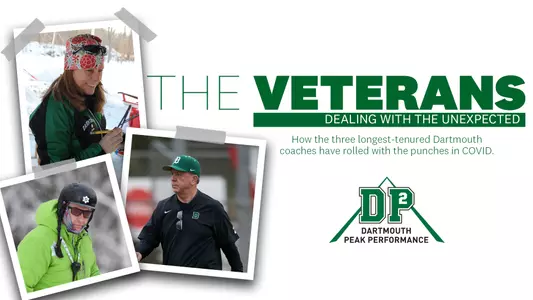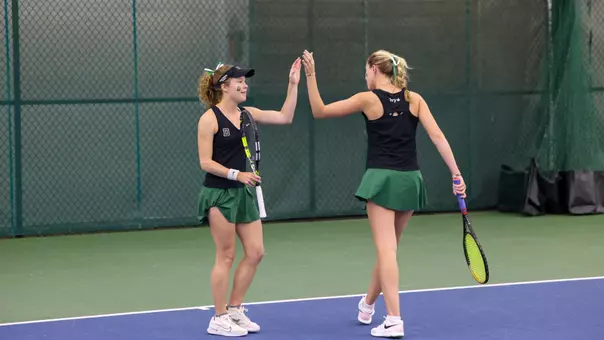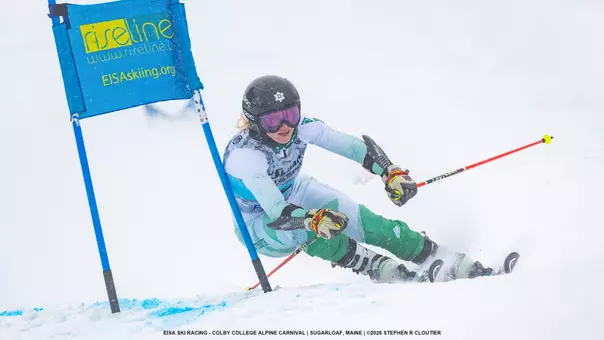
Photo by: Dartmouth
PEAK Magazine Feature: The Veterans
4/22/2021 10:00:00 AM | Baseball, Skiing, Athletics, Peak Performance
No one, no matter how long they have coached, could have anticipated what was to come.
For ski coaches Cami Thompson Graves and Peter Dodge '78, with more than 60 years of collegiate coaching experience between them, the challenge of supporting their student-athletes was front and center. Given the uniqueness of skiing, such as international competition and the nuanced differences between training for Nordic and Alpine teams, there were several factors to consider as they approached a plan to best address the challenges of the pandemic.
"Initially, we tried to create a Plan A, Plan B and Plan C based on what we knew back in the fall," said Dodge. "We started early, back in October, to come up with a plan for our athletes to ski independently with other programs and we encouraged the kids to take responsibility within the process as well. Our athletes are on a variety of tracks and because of that they are inherently independent, so we tried to factor that into our process."
"The end result is that our skiers are racing a lot but are doing so with constant changes."
Dodge noted while also incredibly busy during a normal ski season, he finds himself just as busy this year with many of his skiers away from campus. Keeping track of 10 student-athletes, from Bulgaria to California, and supporting them through logistical challenges while also scheduling time to review film and watch races over Zoom, has provided a critical connection point but required an even greater time investment.
For Thompson Graves, she feels fortunate that there are so many quality cross-country programs, which allowed her student-athletes to make the best choice for them – to come to campus and train here or remain at home, training with local clubs.
"Most of our athletes are getting what they need in terms of training, which is comforting," said Thompson Graves. "The kids are also doing their best to keep it fun, work hard and balance their training with the remote learning component. They've generally stayed healthy and have managed to train consistently, which is the most important thing right now."
Even though there are fewer Dartmouth skiers in town, Dodge remains actively engaged at the Skiway, ensuring the facility remains in good condition for this year and beyond. And despite the lack of activity and competition, he sees a silver lining for his athletes around training and development.
"This year is a gift in terms of ski racing," said Dodge. "There is no effect on a student-athletes' eligibility and the international rankings have been frozen, so our kids have the freedom to work on technique and fitness without worrying about qualifying and rankings. It's a unique opportunity and I think our racers are taking advantage and making the best of it."
On the Nordic side, Thompson Graves employs similar methods as Dodge, using virtual check-ins with her skiers to assess progress and watching races when she can. She also employs an online training log, linked to the athletes' heart-rate monitors, to surveil how they are feeling and doing day to day. In the end, both coaches were clear that whatever is accomplished this year will be a testament to the perseverance of the student-athletes themselves, with an assist from the coaches.
"Overall, I do feel that (the student-athletes) are doing very well, given the circumstances, but it has mostly to do with their ability to be independent and assess what is best for them," said Thompson Graves. "After helping them develop a training plain, our role has been fairly minimal, honestly. We are supporting them however we can and cheering them on at every opportunity, trying to keep things as positive as possible."
"Some of the guys are expressing a readiness for this to be over and I think we all feel that way," added Dodge. "There has been lots of racing, but it is very hit or miss, which makes it hard to plan. That said, everyone misses being together as a team, the focus we have as a group and, most importantly, the opportunity to support each other on a daily basis."
The quality and abundance of snow has provided a silver lining for the coaches this winter and has provided a quality training experience for the skiers on campus. It has also allowed the coaches to sprinkle in a bit of fun to keep things interesting.
"Nearly half our team was back for winter term, so it felt a lot more like traditional team training," said Thompson Graves. "We do have a few who are racing but not nearly as many as we normally would, so it's allowed us to do things like headlamp sprints on the golf course and long skis in the morning to change up the routine. Our athletes have also had a chance to factor in some backcountry skiing or alpine they wouldn't normally get to do in a normal year.
"By the end of the season, all of the skiers will be itching to get into a training routine with a more focused approach for next year. We spent a lot of time planning for things that didn't happen, and we are really missing out on things like testing wax and race-day logistics. At the same time, we've done our best to keep everyone engaged and focused on the future."
Baseball in the Northeast is challenging enough, but managing it in the context of a pandemic is easier with the steady hand of veteran coach Bob Whalen '79a. Now in his 32nd year at Dartmouth with over 600 wins to his credit, Whalen has seen a lot during his career – but nothing like this.
"In this situation, just like in parenting, you are doing as well as the worst child is doing, so we are trying to stay upbeat and make sure everyone has the support they need to get through it," said Whalen. "As much as everyone has good days and bad days, we can't do much about the situation we are in. We certainly let our players express their concerns, but all we can do is continue to make good choices and make the best of it."
As Whalen pointed out, the Ivy League was the first conference to shut down in 2020 and received heavy criticism for it, for about 48 hours, before every other conference ultimately followed suit. In that decision was the reality that the Ivy League put the safety of its players first and, while that theme has been consistent over the last 12 months, the feeling is different this year for one very noteworthy reason.
"We are the only Division I conference not playing, which is hard, especially after cutting things short last spring," said Whalen. "There will inevitably be bumps in the road for those that are playing but we knew this was likely coming, so we at least had a chance to prepare for it."
Despite the potential for a second shuttered season, Whalen has attacked the challenge head on and moved forward with a 'stay positive, stay connected, stay together' approach, and a plan to support his players and provide the best possible training opportunities.
"Every team is different and has different needs," said Whalen. "It was clear our guys did not want to Zoom three times a week and artificially fill their day; they have plenty of things to do, especially in that virtual space.
"My job was not to fill in with programming, but to connect in a consistent and direct way. As we got further into the summer and the fall, it was more about connecting when I had important information. My personality is to be direct, and I wanted to maintain trust and felt the best way to do that was to be as truthful as possible."
Many of the discussions that Whalen has with his players focus very little on baseball, but on the more important, bigger-picture topics like family, health and academics. Utilizing Assistant AD for DP2 and Academics Lindsay Ostler to work through remote learning, Sport Dietician Shira Evans to provide nutritional guidance and support, as well as Senior Associate AD Tiffani Sykes to share information related to off-terms, summer baseball and informal workouts, Whalen sought to provide the information the players needed to minimize stress for them and their families.
"I try to stay as consistent as possible in what we talk about and how we talk about it within our value system," said Whalen. "We'd talk about the same things if we were together on campus and do most of that around our practices, but now we need to be more deliberate and anticipate the many questions they have about things like eligibility, waivers, the D-Plan and all the other moving parts."
Additional calls with alumni such as former Philadelphia Phillies general manager Matt Klentak '02 (business side of sports), pro pitchers Beau '17 and Cole Sulser '12 (playing at the next level) and Brian Conroy '86 (corporate recruiting and culture) have allowed for growth away from the game.
For those on campus, it was as close to business as usual as possible, using the fall to integrate eight freshmen into the program and moving indoors during winter term with 14 different team members. Whalen expects to have 17 on campus for the spring term, which eliminates the opportunity for true intra-squad games and will force the coaching staff to remain creative to keep players working hard within the guidelines on campus.
Widely known for his meticulous practice planning and organization around indoor workouts, this is a pencil-sharpening exercise for someone with Coach Whalen's experience and expertise.
"We are really trying to maximize our time together and work on individual skill yet still need to find elements of competition to do that," said Whalen. "We are taking kids from different positions and creating competitions against each other and mixing up our pitch development to change the focus from velocity one day to pitch command the next and strike percentage the following, all in an effort to keep the players engaged and maintain their competitive fire."
For Whalen, quick to respect the decision of the Ivy League, his biggest concern is the ripple effect of the decision and the variety of ways each student-athlete has been already impacted.
"From day one, I've told our kids to take responsibility for the process, read the emails, listen to the campus conversations and have discussions with your parents about what is best for you and your family," said Whalen. "It's been a challenging year in so many ways, but as I was once told, 'Tough times don't last, tough people do' and I am proud of the way our team has handled things."
For ski coaches Cami Thompson Graves and Peter Dodge '78, with more than 60 years of collegiate coaching experience between them, the challenge of supporting their student-athletes was front and center. Given the uniqueness of skiing, such as international competition and the nuanced differences between training for Nordic and Alpine teams, there were several factors to consider as they approached a plan to best address the challenges of the pandemic.
"Initially, we tried to create a Plan A, Plan B and Plan C based on what we knew back in the fall," said Dodge. "We started early, back in October, to come up with a plan for our athletes to ski independently with other programs and we encouraged the kids to take responsibility within the process as well. Our athletes are on a variety of tracks and because of that they are inherently independent, so we tried to factor that into our process."
"The end result is that our skiers are racing a lot but are doing so with constant changes."
Dodge noted while also incredibly busy during a normal ski season, he finds himself just as busy this year with many of his skiers away from campus. Keeping track of 10 student-athletes, from Bulgaria to California, and supporting them through logistical challenges while also scheduling time to review film and watch races over Zoom, has provided a critical connection point but required an even greater time investment.
For Thompson Graves, she feels fortunate that there are so many quality cross-country programs, which allowed her student-athletes to make the best choice for them – to come to campus and train here or remain at home, training with local clubs.
"Most of our athletes are getting what they need in terms of training, which is comforting," said Thompson Graves. "The kids are also doing their best to keep it fun, work hard and balance their training with the remote learning component. They've generally stayed healthy and have managed to train consistently, which is the most important thing right now."
Even though there are fewer Dartmouth skiers in town, Dodge remains actively engaged at the Skiway, ensuring the facility remains in good condition for this year and beyond. And despite the lack of activity and competition, he sees a silver lining for his athletes around training and development.
"This year is a gift in terms of ski racing," said Dodge. "There is no effect on a student-athletes' eligibility and the international rankings have been frozen, so our kids have the freedom to work on technique and fitness without worrying about qualifying and rankings. It's a unique opportunity and I think our racers are taking advantage and making the best of it."
On the Nordic side, Thompson Graves employs similar methods as Dodge, using virtual check-ins with her skiers to assess progress and watching races when she can. She also employs an online training log, linked to the athletes' heart-rate monitors, to surveil how they are feeling and doing day to day. In the end, both coaches were clear that whatever is accomplished this year will be a testament to the perseverance of the student-athletes themselves, with an assist from the coaches.
"Overall, I do feel that (the student-athletes) are doing very well, given the circumstances, but it has mostly to do with their ability to be independent and assess what is best for them," said Thompson Graves. "After helping them develop a training plain, our role has been fairly minimal, honestly. We are supporting them however we can and cheering them on at every opportunity, trying to keep things as positive as possible."
"Some of the guys are expressing a readiness for this to be over and I think we all feel that way," added Dodge. "There has been lots of racing, but it is very hit or miss, which makes it hard to plan. That said, everyone misses being together as a team, the focus we have as a group and, most importantly, the opportunity to support each other on a daily basis."
The quality and abundance of snow has provided a silver lining for the coaches this winter and has provided a quality training experience for the skiers on campus. It has also allowed the coaches to sprinkle in a bit of fun to keep things interesting.
"Nearly half our team was back for winter term, so it felt a lot more like traditional team training," said Thompson Graves. "We do have a few who are racing but not nearly as many as we normally would, so it's allowed us to do things like headlamp sprints on the golf course and long skis in the morning to change up the routine. Our athletes have also had a chance to factor in some backcountry skiing or alpine they wouldn't normally get to do in a normal year.
"By the end of the season, all of the skiers will be itching to get into a training routine with a more focused approach for next year. We spent a lot of time planning for things that didn't happen, and we are really missing out on things like testing wax and race-day logistics. At the same time, we've done our best to keep everyone engaged and focused on the future."
***
Baseball in the Northeast is challenging enough, but managing it in the context of a pandemic is easier with the steady hand of veteran coach Bob Whalen '79a. Now in his 32nd year at Dartmouth with over 600 wins to his credit, Whalen has seen a lot during his career – but nothing like this.
"In this situation, just like in parenting, you are doing as well as the worst child is doing, so we are trying to stay upbeat and make sure everyone has the support they need to get through it," said Whalen. "As much as everyone has good days and bad days, we can't do much about the situation we are in. We certainly let our players express their concerns, but all we can do is continue to make good choices and make the best of it."
As Whalen pointed out, the Ivy League was the first conference to shut down in 2020 and received heavy criticism for it, for about 48 hours, before every other conference ultimately followed suit. In that decision was the reality that the Ivy League put the safety of its players first and, while that theme has been consistent over the last 12 months, the feeling is different this year for one very noteworthy reason.
"We are the only Division I conference not playing, which is hard, especially after cutting things short last spring," said Whalen. "There will inevitably be bumps in the road for those that are playing but we knew this was likely coming, so we at least had a chance to prepare for it."
Despite the potential for a second shuttered season, Whalen has attacked the challenge head on and moved forward with a 'stay positive, stay connected, stay together' approach, and a plan to support his players and provide the best possible training opportunities.
"Every team is different and has different needs," said Whalen. "It was clear our guys did not want to Zoom three times a week and artificially fill their day; they have plenty of things to do, especially in that virtual space.
"My job was not to fill in with programming, but to connect in a consistent and direct way. As we got further into the summer and the fall, it was more about connecting when I had important information. My personality is to be direct, and I wanted to maintain trust and felt the best way to do that was to be as truthful as possible."
Many of the discussions that Whalen has with his players focus very little on baseball, but on the more important, bigger-picture topics like family, health and academics. Utilizing Assistant AD for DP2 and Academics Lindsay Ostler to work through remote learning, Sport Dietician Shira Evans to provide nutritional guidance and support, as well as Senior Associate AD Tiffani Sykes to share information related to off-terms, summer baseball and informal workouts, Whalen sought to provide the information the players needed to minimize stress for them and their families.
"I try to stay as consistent as possible in what we talk about and how we talk about it within our value system," said Whalen. "We'd talk about the same things if we were together on campus and do most of that around our practices, but now we need to be more deliberate and anticipate the many questions they have about things like eligibility, waivers, the D-Plan and all the other moving parts."
Additional calls with alumni such as former Philadelphia Phillies general manager Matt Klentak '02 (business side of sports), pro pitchers Beau '17 and Cole Sulser '12 (playing at the next level) and Brian Conroy '86 (corporate recruiting and culture) have allowed for growth away from the game.
For those on campus, it was as close to business as usual as possible, using the fall to integrate eight freshmen into the program and moving indoors during winter term with 14 different team members. Whalen expects to have 17 on campus for the spring term, which eliminates the opportunity for true intra-squad games and will force the coaching staff to remain creative to keep players working hard within the guidelines on campus.
Widely known for his meticulous practice planning and organization around indoor workouts, this is a pencil-sharpening exercise for someone with Coach Whalen's experience and expertise.
"We are really trying to maximize our time together and work on individual skill yet still need to find elements of competition to do that," said Whalen. "We are taking kids from different positions and creating competitions against each other and mixing up our pitch development to change the focus from velocity one day to pitch command the next and strike percentage the following, all in an effort to keep the players engaged and maintain their competitive fire."
For Whalen, quick to respect the decision of the Ivy League, his biggest concern is the ripple effect of the decision and the variety of ways each student-athlete has been already impacted.
"From day one, I've told our kids to take responsibility for the process, read the emails, listen to the campus conversations and have discussions with your parents about what is best for you and your family," said Whalen. "It's been a challenging year in so many ways, but as I was once told, 'Tough times don't last, tough people do' and I am proud of the way our team has handled things."
Men's Basketball vs. Princeton Postgame Press Conference 1-19-26
Tuesday, January 20
Women's Basketball at Penn Postgame 1-19-26
Monday, January 19
Men's Hockey Highlights vs St. Lawrence 1.17.26
Sunday, January 18
Men's Hockey Postgame vs St. Lawrence 1-17-26
Sunday, January 18








